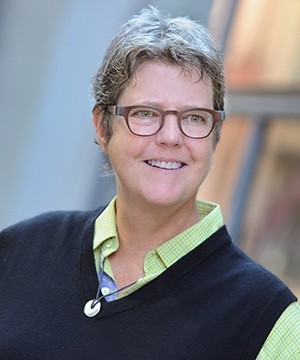5 Questions with Katherine Franke on Masterpiece Cakeshop Case
Katherine Franke, a law professor gender and sexuality studies, discusses the implications of the U.S. Supreme Court's decision in the Masterpiece Cakeshop case.

After the U.S. Supreme Court agreed to hear the case of a Colorado baker who refused to make a cake for the marriage of a gay couple, nearly 100 “friend of the court briefs” were filed by groups on every side of the political and religious spectrum.
One of the amicus briefs was written by Katherine Franke, the Sulzbacher Professor of Law, Gender, and Sexuality Studies at Columbia, on behalf of the Public Rights/Private Conscience Project at Columbia Law School, which brings legal academic expertise to cases in which religious liberty rights conflict with or undermine other fundamental rights to equality and liberty. Now that the Court ruled—narrowly—in the baker’s favor, Franke explains the decision.
Q. How did the Supreme Court decide the Masterpiece Cakeshop case today?
A. Justice Kennedy ruled for a 7-2 majority that principles of religious liberty must be harmonized with principles of equality. The Court’s ruling is quite narrow, turning on the fact that some members of the Colorado Civil Rights Commission (the body that ruled on the case in the first instance) made statements that the Court thought demonstrated hostility toward religion. So Justice Kennedy framed the issue as one of state-based discrimination against people who hold particular religious views, not as about the rights of same-sex couples or LGBTQ rights more generally.
Q. What should we make of the way the Court framed the issue?
A. Many people were disappointed to see the Court rule in favor of Jack Phillips, the Christian baker who refused to bake a wedding cake for two men because of his religious beliefs, and see the opinion as a defeat for the rights of LGBTQ people. It’s important to recognize, however, that the opinion does not actually limit anti-discrimination law. The Court explained, "It is a general rule that [faith-based] objections do not allow business owners and other actors in the economy and in society to deny protected persons equal access to goods and services under a neutral and generally applicable public accommodations law.”
The opinion contains soaring language recognizing the importance of gay rights: "Our society has come to the recognition that gay persons and gay couples cannot be treated as social outcasts or as inferior in dignity and worth. For that reason, the laws and the Constitution can—and in some instances must—protect them in the exercise of their civil rights. The exercise of their freedom on terms equal to others must be given great weight and respect by the courts."
Q. You wrote a “friend of the Court” brief in the case, does today’s decision reflect the arguments you made?
A. The Public Rights/Private Conscience Project and Muslim Advocates wrote a brief in this case on behalf of 15 religious minority and civil rights groups, arguing that religious liberty principles must be harmonized with equality principles, and that the rights of religious objectors find their limit when they undermine fundamentally important equality principles, such as Colorado's anti-discrimination law. We took the position that these are mutually reinforcing values, and we are pleased to see that the Court’s decision in Masterpiece Cakeshop embraces this approach, despite setting aside the ruling against Jack Phillips.
Q. There are many similar cases making their way to the Supreme Court, where business owners have sought a religious exemption from complying with anti-discrimination laws. How does today’s decision in Masterpiece Cakeshop affect those other cases?
A. None of those other cases include evidence of any bias against faith-based objectors, as was the case in Masterpiece Cakeshop. So the big questions these cases raise—can a person’s sincerely held religious beliefs be used to avoid compliance with anti-discrimination laws— remains unanswered. There were, however, some important signs in Justice Kennedy’s decision today that point in the direction that religious objectors may not win in those cases. The Court cited approvingly a case from the 1960s that found that a restaurant owner could not deny service to African Americans, even if he had a sincerely held religious reason for doing so. So that principle remains as an important limit on religious liberty rights in contexts where overarching equality principles would be undermined by the overly broad deference to religion.
Q. What’s at stake in the tension between religious liberty and LGBTQ equality?
A. The plaintiff’s lawyers view religious liberty rights as more fundamental than any other rights, and thus should occupy the top tier of constitutional protection. The rights of LGBTQ people, women, people of color and others, in their view, should yield when in conflict with religious liberty. This approach to constitutional law derives from something we call “natural law” — that no man-made law can be superior to God’s law. This amounts to a radical theocratization of the Constitution, a document that was intended to be an adamantly secular social contract. Ideological conservatives have been committed for generations to the idea that government cannot, indeed may not, tell business owners who they can serve and how. They are using religion-based resistance to same-sex marriage in order to weaken the larger national commitment to enforcing non-discrimination laws in business settings. In this sense, the Masterpiece Cakeshop case is the logical next step after the Hobby Lobby case, where a business owner objected to the federal government mandating the kind of employee benefits it had to provide.
—Interviewed by Sabina Lee. Elizabeth Reiner Platt, director of the Public Rights/Private Conscience Project, contributed to the answers.